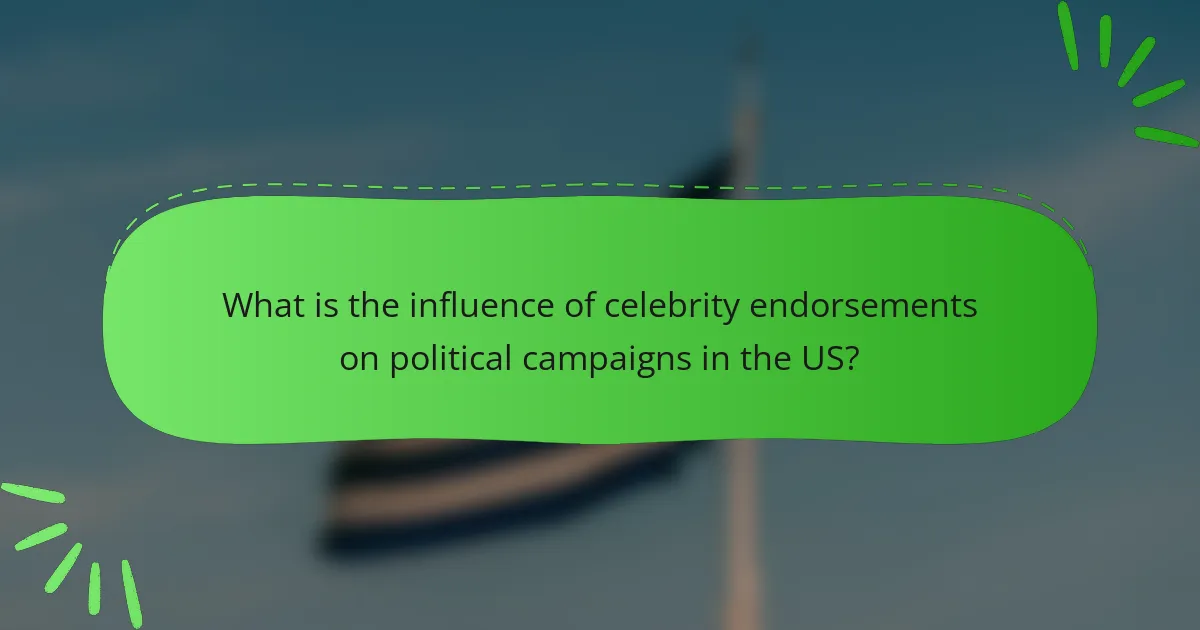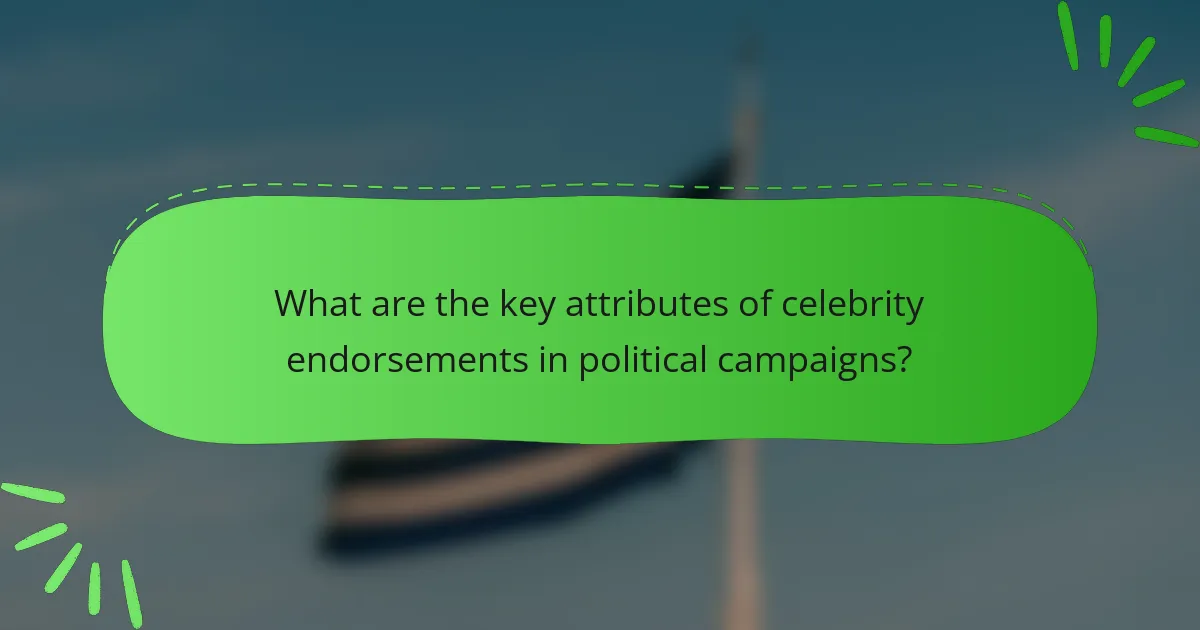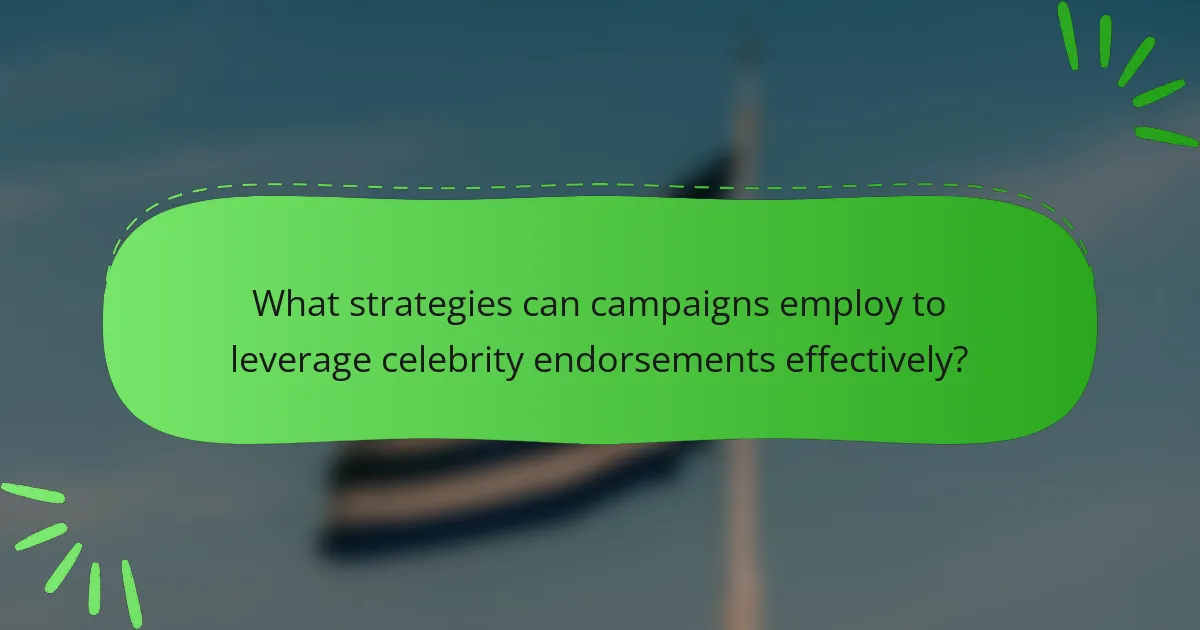Celebrity endorsements play a crucial role in shaping political campaigns in the United States by enhancing candidate visibility and appealing to younger voters. Research indicates that these endorsements can sway public opinion, increase voter turnout, and boost campaign donations. Key attributes of celebrity endorsements include visibility, credibility, and emotional connection, which together help frame a candidate’s image positively. Campaigns can maximize the impact of celebrity endorsements by aligning the celebrity’s values with their message and utilizing social media for broader engagement. Studies show that effective endorsements can influence undecided voters and significantly enhance voter participation.

What is the influence of celebrity endorsements on political campaigns in the US?
Celebrity endorsements significantly influence political campaigns in the US. They can enhance a candidate’s visibility and appeal to younger voters. Research indicates that celebrities can sway public opinion and increase voter turnout. For example, the 2008 Obama campaign effectively utilized endorsements from stars like Oprah Winfrey. Studies show that celebrity endorsements can lead to increased donations and volunteer sign-ups. The presence of a celebrity can also frame the candidate’s image positively. This strategy leverages the celebrity’s fan base to reach a wider audience. Overall, celebrity endorsements serve as a powerful tool in modern political campaigning.
How have celebrity endorsements evolved in the context of political campaigns?
Celebrity endorsements in political campaigns have evolved significantly over the decades. Initially, endorsements were rare and often limited to local figures. In the 1960s, celebrities like John Wayne began to support candidates, marking a shift toward national visibility. By the 2000s, endorsements became commonplace, with stars like Oprah Winfrey and Jay-Z actively campaigning for candidates. Social media has further transformed this landscape, allowing celebrities to reach millions instantly. Data from a 2020 study indicates that candidates endorsed by celebrities saw a 5-10% increase in voter turnout. Today, endorsements are strategic tools for mobilizing younger voters, showcasing the power of celebrity influence in modern politics.
What historical examples illustrate the impact of celebrity endorsements in politics?
Celebrity endorsements have significantly impacted politics throughout history. One prominent example is Ronald Reagan, who leveraged his Hollywood background to enhance his political appeal. His celebrity status helped him connect with voters during the 1980 presidential campaign. Another example is Barack Obama, who received endorsements from numerous celebrities, including Oprah Winfrey. This endorsement boosted his visibility and engagement, particularly among younger voters.
In 2004, John Kerry’s campaign featured endorsements from stars like Bruce Springsteen and Ben Affleck. Their involvement aimed to galvanize support among specific demographic groups. Additionally, in the 2016 election, celebrities like Taylor Swift and Lady Gaga influenced public opinion and voter turnout. Their social media presence and activism played a crucial role in mobilizing their fan bases.
These instances demonstrate how celebrity endorsements can shape political narratives and voter behavior, impacting election outcomes.
How do celebrity endorsements differ across various political campaigns?
Celebrity endorsements vary significantly across political campaigns in terms of impact and strategy. Different political parties utilize celebrities to align their messages with specific demographics. For instance, Democratic campaigns often engage celebrities known for activism to resonate with younger voters. In contrast, Republican campaigns may choose celebrities with mainstream appeal to attract broader audiences.
The effectiveness of these endorsements can also differ based on the celebrity’s public image. High-profile endorsements can lead to increased voter turnout, especially when the celebrity is perceived as relatable. Research shows that endorsements from trusted figures can sway undecided voters, particularly in tight races.
For example, during the 2008 presidential election, celebrities like Oprah Winfrey endorsed Barack Obama, significantly boosting his visibility among key voter segments. Conversely, endorsements by controversial figures can polarize opinions and may backfire. Overall, the choice of celebrity and the campaign’s target audience play crucial roles in shaping the endorsement’s effectiveness.
Why are celebrity endorsements significant in shaping public opinion?
Celebrity endorsements are significant in shaping public opinion because they leverage the trust and admiration people have for celebrities. Celebrities often possess a strong influence over their followers, creating a perception of credibility and relatability. This influence can lead to increased awareness of political issues and candidates. Research indicates that endorsements can boost a candidate’s favorability ratings by as much as 20%. Moreover, endorsements can mobilize younger voters who may feel disconnected from traditional political messaging. The emotional connection fans have with celebrities can translate into political engagement and action. Thus, celebrity endorsements play a crucial role in shaping perceptions and behaviors in political campaigns.
What psychological factors contribute to the effectiveness of celebrity endorsements?
Celebrity endorsements are effective due to several psychological factors. One key factor is the principle of social proof. People tend to follow the actions of others, especially those they admire. When a celebrity endorses a product or candidate, it creates a perception of popularity. This can lead to increased trust and acceptance among the audience.
Another factor is the halo effect. This occurs when the positive qualities of a celebrity influence perceptions of the endorsed entity. For instance, if a celebrity is viewed as charismatic or trustworthy, these traits may transfer to the product or candidate they endorse.
Additionally, identification plays a crucial role. Consumers often relate to celebrities who share similar values or lifestyles. This connection can enhance the audience’s engagement and loyalty. Research shows that relatable endorsements can significantly impact consumer behavior.
Emotional appeal is also vital. Celebrities can evoke strong emotions, making the endorsement more memorable. Emotional responses can lead to greater persuasion and influence.
Lastly, the scarcity principle can enhance effectiveness. Limited-time endorsements or exclusive partnerships can create urgency. This can motivate consumers to act quickly, believing they might miss out on something valuable.
These psychological factors collectively contribute to the effectiveness of celebrity endorsements in various contexts, including political campaigns.
How do celebrity endorsements affect voter turnout and engagement?
Celebrity endorsements positively affect voter turnout and engagement. Research shows that endorsements from celebrities can significantly increase interest in political campaigns. For instance, a study by the Pew Research Center found that younger voters are more likely to engage when celebrities advocate for candidates. Additionally, celebrity endorsements can enhance the perceived relatability of candidates. This relatability encourages individuals to participate in elections. The endorsement can also amplify campaign messages through social media platforms. Data indicates that campaigns utilizing celebrity endorsements often see a rise in voter registration and participation rates.

What are the key attributes of celebrity endorsements in political campaigns?
Key attributes of celebrity endorsements in political campaigns include visibility, credibility, and emotional connection. Visibility refers to the ability of celebrities to attract media attention and reach a larger audience. Credibility is established when a celebrity’s reputation aligns with the campaign’s values, enhancing trust among voters. Emotional connection emerges from the personal affinity fans have for celebrities, influencing their political opinions. Research indicates that endorsements can sway undecided voters, especially younger demographics. For instance, a study by the Pew Research Center found that 70% of young voters are influenced by celebrity opinions.
How do different types of celebrities influence political campaigns?
Different types of celebrities influence political campaigns through their reach and public perception. Celebrities can mobilize voters by leveraging their fan base. For instance, musicians often engage younger demographics, increasing voter turnout among that age group. Actors may bring attention to specific issues, shaping public discourse. Athletes can influence public opinion through their platforms, especially in communities passionate about sports. Research shows that endorsements from well-known figures can significantly sway undecided voters. A study by the Pew Research Center found that 30% of young voters were more likely to support a candidate endorsed by a celebrity they admire. This demonstrates the tangible impact celebrities have on political engagement and decision-making.
What role do actors, musicians, and athletes play in political endorsements?
Actors, musicians, and athletes serve as influential figures in political endorsements. Their celebrity status can significantly sway public opinion and mobilize voters. They often leverage their platforms to raise awareness about specific issues. For example, celebrities like Oprah Winfrey have endorsed candidates, impacting election outcomes. Research shows that endorsements from popular figures can increase voter turnout. A study by the Pew Research Center indicates that younger voters are particularly influenced by celebrity endorsements. Their involvement can bring attention to marginalized voices and social justice issues. Overall, these figures play a crucial role in shaping political narratives and engaging the electorate.
How does the celebrity’s personal brand impact their endorsement effectiveness?
A celebrity’s personal brand significantly impacts their endorsement effectiveness. A strong personal brand enhances credibility and relatability. This connection fosters trust between the celebrity and the audience. For example, research shows that consumers are more likely to trust endorsements from celebrities they perceive as authentic. According to a study published in the Journal of Advertising Research, 70% of consumers are influenced by a celebrity’s perceived authenticity. Furthermore, a well-aligned personal brand with the endorsed product increases purchase intent. Celebrities with a positive public image can drive higher engagement in campaigns. This correlation is particularly evident in political endorsements, where a celebrity’s values resonate with voters.
What are the potential risks associated with celebrity endorsements in politics?
Celebrity endorsements in politics can lead to several potential risks. One risk is the oversimplification of complex political issues. Celebrities may not fully understand the policies they endorse, leading to misinformed public perceptions. Another risk is the potential alienation of voters. Fans of a celebrity may not share the same political beliefs, causing divisions among constituents. Additionally, celebrity endorsements can overshadow substantive political discourse. The focus may shift from policies to the celebrity’s persona, reducing the importance of critical issues. There is also a risk of backlash. If a celebrity becomes controversial, their association with a political candidate can harm that candidate’s reputation. Lastly, reliance on celebrity endorsements can create a perception of insincerity. Voters may question the authenticity of a candidate’s commitment to their platform.
How can negative publicity surrounding a celebrity affect a political campaign?
Negative publicity surrounding a celebrity can significantly harm a political campaign. When a celebrity endorses a candidate, their reputation directly impacts the candidate’s image. If the celebrity faces scandals or negative press, it can lead to voter disapproval of the candidate. Research indicates that public perception of celebrity endorsements can sway voter opinions. For example, a 2018 study in the Journal of Political Marketing found that negative celebrity news correlated with decreased support for associated candidates. This illustrates that the fallout from a celebrity’s negative publicity can diminish a candidate’s credibility and voter trust.
What are the implications of celebrity endorsements on a candidate’s credibility?
Celebrity endorsements can significantly impact a candidate’s credibility. When a well-known figure supports a candidate, it can enhance the candidate’s public image. This association often leads to increased trust among voters. Studies have shown that endorsements can sway undecided voters. For instance, a survey by the Pew Research Center indicated that 30% of voters are influenced by celebrity endorsements. However, the effect can vary based on the celebrity’s reputation. A positive celebrity can boost credibility, while a controversial figure may harm it. Overall, celebrity endorsements can be a double-edged sword in shaping a candidate’s perceived reliability.

What strategies can campaigns employ to leverage celebrity endorsements effectively?
Campaigns can leverage celebrity endorsements effectively by aligning the celebrity’s values with the campaign’s message. This alignment creates authenticity and resonates with the target audience. Engaging celebrities who have a strong connection to the issue at hand enhances credibility. Utilizing social media platforms allows for broader reach and engagement with younger demographics. Personal stories shared by celebrities can humanize candidates and make them relatable. Campaigns should also consider timing endorsements to maximize impact, especially during key moments in the election cycle. Research indicates that celebrity endorsements can increase voter turnout by up to 20%. This demonstrates the significant influence celebrities can have on public perception and voter behavior.
How can campaigns select the right celebrities for endorsements?
Campaigns can select the right celebrities for endorsements by aligning their values with the campaign’s message. This alignment ensures authenticity and resonates with the target audience. Additionally, campaigns should assess the celebrity’s public image and past endorsements. A positive and consistent image can enhance credibility. Campaigns must also consider the celebrity’s reach and influence on social media platforms. Research shows that celebrities with large followings can significantly boost engagement. Finally, campaigns should evaluate the demographic appeal of the celebrity to ensure they connect with the desired voter base.
What criteria should be considered when choosing a celebrity endorser?
The criteria for choosing a celebrity endorser include relevance, credibility, and audience alignment. Relevance ensures the celebrity’s image matches the campaign’s message. Credibility involves the celebrity’s reputation and trustworthiness among the target demographic. Audience alignment focuses on the celebrity’s ability to connect with the campaign’s intended voter base. These factors enhance the effectiveness of the endorsement. For example, research shows that endorsements from relatable celebrities can significantly increase voter engagement and support.
How can campaigns align celebrity endorsements with their political message?
Campaigns can align celebrity endorsements with their political message by ensuring that the celebrity’s values resonate with the campaign’s core principles. This alignment creates authenticity, making the endorsement more credible to the audience. For instance, if a celebrity advocates for environmental issues, they should endorse candidates who prioritize climate policies.
Moreover, campaigns can leverage the celebrity’s platform to amplify specific political messages. This strategy can increase reach and engagement among younger voters, who may identify more with the celebrity than traditional political figures. Research shows that endorsements from relatable figures can significantly influence voter perception and behavior.
Additionally, campaigns should collaborate with celebrities to craft messages that reflect both their brand and the political agenda. This co-creation can lead to more impactful and relatable content. For example, a celebrity might share personal stories that connect their experiences to the candidate’s policies.
By maintaining consistency between the celebrity’s public persona and the campaign’s message, campaigns can enhance the overall effectiveness of the endorsement. This approach fosters a unified narrative that resonates with voters, ultimately driving engagement and support for the candidate.
What are best practices for integrating celebrity endorsements into campaign strategies?
Identify the right celebrity for your campaign. The celebrity should align with your brand values and target audience. Research their public image and past endorsements. Ensure they have a positive reputation and credibility. Create authentic messaging that resonates with the celebrity’s persona. This enhances the believability of the endorsement. Utilize multiple platforms for the endorsement. Social media, television, and events can maximize reach. Monitor the campaign’s performance closely. Analyze engagement metrics and audience feedback. Adjust strategies as needed based on data. Build long-term relationships with the celebrity. This can lead to more consistent messaging and loyalty.
How can social media enhance the impact of celebrity endorsements?
Social media enhances the impact of celebrity endorsements by increasing visibility and engagement. Platforms like Instagram and Twitter allow celebrities to reach millions instantly. This broad reach amplifies the message of the endorsement. Social media facilitates direct interaction between celebrities and their followers. This interaction fosters a sense of trust and authenticity. According to a study by the American Marketing Association, endorsements from celebrities on social media can increase brand recall by up to 20%. Additionally, social media enables real-time sharing and virality of content. When followers share endorsements, it expands the audience further. This creates a snowball effect, increasing the overall impact of the endorsement.
What lessons can be learned from successful celebrity endorsement campaigns?
Successful celebrity endorsement campaigns demonstrate the importance of authenticity and relatability. Celebrities who genuinely align with a brand resonate better with audiences. For instance, the partnership between Nike and Colin Kaepernick highlighted social justice, enhancing brand loyalty. Effective campaigns also leverage the celebrity’s existing fan base to expand reach. Research shows that endorsements can increase sales by 4% to 8% when the celebrity is well-matched with the product. Timing is critical; aligning endorsements with relevant social issues can amplify impact. Finally, transparency in endorsements builds trust and strengthens consumer relationships.
The main entity of this article is celebrity endorsements in political campaigns in the US. The article examines the significant influence of celebrity endorsements on voter behavior, campaign visibility, and public opinion. It explores the evolution of endorsements, historical examples of their impact, and the psychological factors that enhance their effectiveness. Additionally, the article discusses the strategic selection of celebrities, potential risks associated with endorsements, and best practices for integrating them into campaign strategies. Overall, it highlights how celebrity endorsements serve as powerful tools in shaping political narratives and engaging voters.